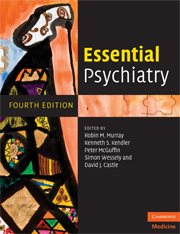Book contents
- Essential Psychiatry
- Essential Psychiatry
- Copyright page
- Contents
- Contributors
- Preface to the fourth edition
- Section 1 The Tools of Psychiatry
- 1 The mental state and states of mind
- 2 Current approaches to classification
- 3 Research methods in psychiatry
- 4 Imaging of brain structure and function: relevance to psychiatric disorders
- 5 Genetic epidemiology
- Section 2 Psychiatric Disorders
- Section 3 Special Topics
- Section 4 Psychiatry in Specific Settings
- Section 5 Treatments in Psychiatry
- Index
1 - The mental state and states of mind
from Section 1 - The Tools of Psychiatry
Published online by Cambridge University Press: 22 August 2009
- Essential Psychiatry
- Essential Psychiatry
- Copyright page
- Contents
- Contributors
- Preface to the fourth edition
- Section 1 The Tools of Psychiatry
- 1 The mental state and states of mind
- 2 Current approaches to classification
- 3 Research methods in psychiatry
- 4 Imaging of brain structure and function: relevance to psychiatric disorders
- 5 Genetic epidemiology
- Section 2 Psychiatric Disorders
- Section 3 Special Topics
- Section 4 Psychiatry in Specific Settings
- Section 5 Treatments in Psychiatry
- Index
Summary
- Type
- Chapter
- Information
- Essential Psychiatry , pp. 3 - 38Publisher: Cambridge University PressPrint publication year: 2008
- 3
- Cited by



